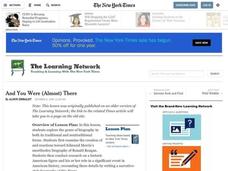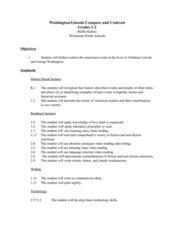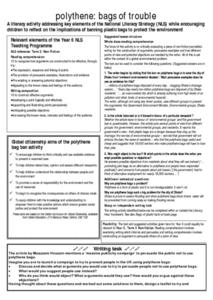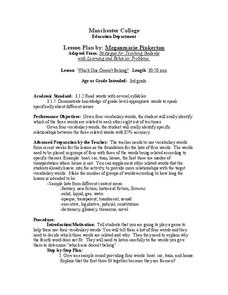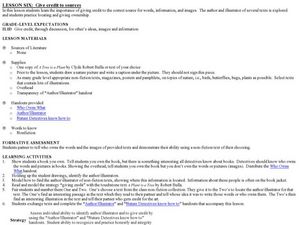Curated OER
Famous Peacemakers - Creating a Declaration of Peace
Students create written reports about a famous peacemaker. In this peacemaker lesson plan, students use books and the internet to research someone who is famous for creating peace in the world and write a report on it.
Curated OER
Hiragana - Perfect ~ Writing a Japanese Pictionary
Students listen to a story and view Japanese artifacts. They use the internet to explore the writings known as Hiragana. They create their own Japanese pictionaries and share them with the class.
Curated OER
Essay/WebQuest Ideas
Students use the ECO Exploration, the Fur Trade and Hudson's Bay Company, the ECO database, as well as other sources identified to complete a report or essay on some aspect of Hudson's Bay Company and life in what would one day become...
Curated OER
Report/Presentation Ideas
Students use the ECO Exploration, the Fur Trade and Hudson's Bay Company, the ECO database, as well as other sources identified to develop a report or presentation on some aspect of Hudson's Bay Company and life in what would one day...
Curated OER
Be It Resolved: A lesson In Debating
Students examine debating procedures. In teams, students research the effects of European-Aboriginal interaction. Students collect, analyze and interpret information to support their side of the debate.
Curated OER
Note-Taking
Students take notes and summarize information. In this communication lesson, students summarize information by taking notes using the various methods that their instructor presents to them.
Curated OER
That's Not Fair!! Human Rights Violations during the 1800s
Students explore the migration of African Americans into the Hoosier area. They develop a time line showing migration patterns in Indiana and explore reasons for African Americans to settle and/or travel through Indiana.
Curated OER
Lesson Two: Discover a purpose for keywords
Second graders research a topic in nature. In this research instructional activity, 2nd graders pick a nature topic and discuss the keywords needed to find more information about that topic. They fill their information out on a organizer.
Curated OER
And You Were (Almost) There
Students explore the genre of biography in both its traditional and nontraditional forms. They examine Edmund Morris's unorthodox biography of Ronald Reagan. They conduct research on an historic American and write their own biographies.
Curated OER
Washington/Lincoln Compare and Contrast
Students examine the lives of George Washington and Abraham Lincoln. Using the information, they complete a Venn diagram discovering what the two men had in common. In groups, they review a timeline made in an earlier lesson plan and...
Curated OER
Genres in Literature
Students analyze and differentiate between various genres of literature. They view a slideshow, take a true/false quiz, create an Idea Pad file, and create an idea map of the various genres.
Curated OER
Polythene: Bags Of Trouble
Pupils investigate the use of polythene bags in the community and measure the possible impact upon the environment. They conduct research using a variety of resources. The information is used in order to create an evaluative opintion of...
Curated OER
Cinderbank
Fourth graders identify major components of a "Cinderella" story in order to create a database.
Curated OER
Twenty-one Balloons
Fifth graders determine what the Newbery Award is and why it is importance. They examine a number of Newbery Award winning books and listen to a book talk about William Pene DuBois', Twenty-One Balloons while watching a PowerPoint...
Curated OER
The Life Cycle of the Butterfly
Students examine the life of a butterfly. They write a biography from the point of view of a caterpillar using new vocabulary. They use magnifying glasses to examine butterflies and caterpillars.
Curated OER
Which One Doesn't Belong?
Third graders identify words that are related with 80% accuracy. Given a list of four vocabulary words, 3rd graders identify specific relationships between three of the four words. They also identify which of the four words are not...
Curated OER
Roughing It in the Backwoods
Learners discuss the differences between living during the mid-19th century and today and then debate which would be better.
Curated OER
What Was It Like To Live in Tudor Times?
Students compare and contrast the lives of the rich and poor people in Tudor times. Students observe photographs of Tudor life. They investigate word clues describing the lives of the people. Students create a presentation on their...
Curated OER
Language Arts: Take Me to the Hall of Fame
Students write persuasive letters supporting a trip to the Baseball Hall of Fame. Once they have written the letter, they respond to it from the coach's point of view. In addition, students compose various conclusions to their letters.
Curated OER
Africa
Second graders explore Africa. They label the popular places in Africa on a map. Students label the different cities and monuments that are popular in Africa. They discuss the similarities and differences between cities in Africa and...
Curated OER
Farm Animals
First graders conduct research about farm animals and what it is like to live on a farm. They explore a variety of websites and complete an online WebQuest. They select a farm animal, and write a report about their animal's...
Curated OER
Year of the Impossible Goodbyes by Sook Nyul Choi
Students analyze Korean culture from their literature piece. They investigate the theme of oppression by an occupying army. Students encounter courage, resistance movements and explore the underground railroads.
Curated OER
Give Credit to Sources
Third graders practice referencing material. In this giving credit to sources lesson, 3rd graders explore ownership of words and images by drawing and labeling a picture then problem solving how to identify the author.
Curated OER
Celebrating Thanksgiving
First graders identify symbols associated with special days and give reasons for observing holidays. They compare families of long ago with todya and talk about the first Thanksgiving and how it is celebrated in modern times. For...










